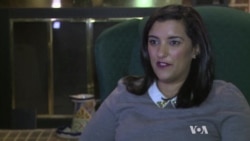Growing up in a Muslim family near Raleigh, North Carolina, Sally Ayad felt like the all-American girl.
"I played piano. I had sports. I was in Girl Scouts, sold my cookies. And I loved it," she recalled. “The honest truth is that I don't think that many people knew what a Muslim was back then.”
In the American south, a region with no shortage of bigotry in the 1960s and 70s, Muslims actually had it good in the area known as the Triangle - a region that includes the central North Carolina cities of Raleigh, Durham and Chapel Hill.
The idyll survived even the aftermath of the September 11, 2001 attacks. But it was shattered on Feb. 10, when three Muslim university students living in Chapel Hill were gunned down by a neighbor.
The victims were sisters Razan and Yusor Abu Salha, and the latter's newlywed husband, Deah Barakat.
The man who confessed to the murders, Craig Stephen Hicks, had a history of aggressive behavior over parking spots in their condominium complex. He also had professed atheist beliefs on his Facebook page.
Few Muslims here have any doubt the victims were targeted for their faith. A friend quoted by the New York Times said Barakat looked “like your average white guy,” and the murders happened shortly after his wife moved in with him and was visited by her sister. Both women were veiled.
Sally Ayad says she was so horrified by the murders she didn’t know how to react at first.
“You were sad, you were angry, but then you started looking at your own children and yourself, and this sense of fear came over you really quick,” she said.
Like the victims, Ayad is a second-generation American. Her father, Hafez Ayad, was born in Alexandria, Egypt and after immigrating in 1969, he got a Ph.D. in entomology and a research job with the chemical company Union Carbide.
Listening to him tell his story, you get the feeling his faith in Islam is matched only by a belief in the promise of America.
“If you are willing to work hard and do your best, you can achieve the American dream,” he said.
Once better known for its tobacco production, the Triangle was transformed into a high-tech and research corridor that began to attract hundreds of companies in the 1960s. In fact, it is named after the Research Triangle Park, one of the largest private-sector research concentrations in the world.
The area became a magnet for highly educated immigrants, including Muslims. The Muslim population is estimated at 38,000; many have advanced degrees and successful careers.
“I have 10 patents in my name, and there are a lot of examples like this in this area,” Ayad said.
Surveys show that America's Muslims are on average better educated and more affluent than those in Europe - partly because of an immigration policy at the time designed to attract educated foreigners.
Still, things weren't always rosy in this part of North Carolina. One of Hafez Ayad's earliest memories was driving down a highway and seeing a man in another vehicle dressed like a member of the American Nazi Party.
Some Triangle Muslims say a foreshadowing of the Chapel Hill murders came in January, when Duke University, the most prestigious in the area, planned to allow the adhan - the Muslim call to prayer - to be chanted from the top of its neo-gothic Chapel tower.
Duke was founded by Protestant Methodists who were serious about Christianity: the campus is laid out in the form of a cross.
But the chapel's associate dean for religious life argued that with so much negative attention focused on Muslims because of militant movements like ISIS and Boko Haram, the gesture was aimed at giving voice to the university's Muslim community, which “represents a strikingly different face of Islam than is seen on the nightly news: one that is peaceful and prayerful.”
But after the plan was announced, the university received threats of violence and a high-profile protest by Franklin Graham, son of the famous evangelist Billy Graham.
“As Christianity is being excluded from the public square and followers of Islam are raping, butchering and beheading Christians, Jews, and anyone who doesn’t submit to their Sharia Islamic law, Duke is promoting this in the name of religious pluralism,” Graham wrote in a Facebook post.
Islamic Studies professor Omid Safi was dismayed.
“We should in many ways be holding up a light for what it means to be an inclusive, pluralistic community. And in fact if we can’t have these kinds of practices on a college campus, then where are we supposed to have them?” he said.
Despite the setbacks, Sally Ayad remains hopeful.
“As a community we’ll pull through this, and we’re going to pull out positively. And I wouldn’t want to be anywhere else honestly,” she said.
But Ayad has her own children now, ages 7 and 10, and she worries they will face the kind of bigotry - and maybe even violence - that she never knew growing up.





